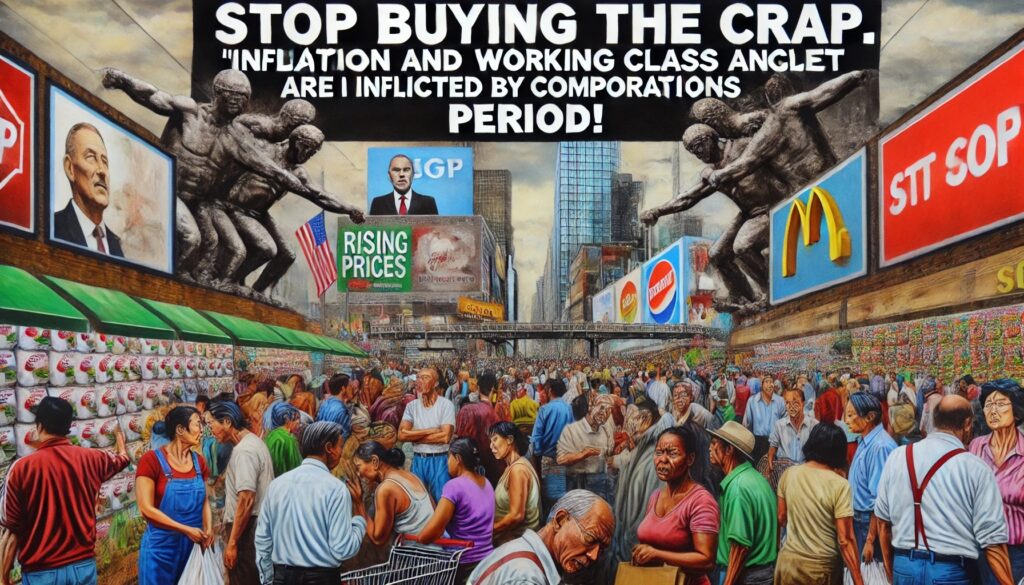Corporations drive inflation, exploiting working-class struggles for profit. It’s time to challenge corporate greed and demand economic justice for all.
Don’t buy the inflation crap.
Podcasts (Video — Audio)
One thing remains abundantly clear: corporations prioritizing profit over people consistently shortchanged the working class. Inflation, rising costs, and financial instability are not mere accidents or the results of uncontrollable market forces; they are the direct outcomes of corporate greed and mismanagement. As Jack, our broadcast engineer, aptly says, “If they are making record profits, they’re not paying you enough.” This statement underscores the systemic exploitation that underpins modern capitalism.
Record Profits and Working-Class Exploitation
Corporations have been posting record profits while workers struggle to make ends meet. This discrepancy highlights a fundamental injustice: those who generate wealth through their labor receive a pittance compared to the massive earnings of their employers. This exploitation is not just a moral failing but a structural one. Workers are the backbone of any economy, yet they are often the most undervalued and underpaid.
The Role of Unions
One way for workers to fight back is through unionization. Unions provide a collective voice for workers, enabling them to negotiate better wages, benefits, and working conditions. Despite the clear benefits of unionization, corporate interests and their political allies have systematically undermined unions through legislation, propaganda, and outright intimidation. Yet, the importance of unions cannot be overstated. They are essential for balancing the scales and ensuring workers receive their fair share of the economic pie.
Corporate Greed and Inflation
Corporate greed is a significant contributor to the current economic malaise. Many in the corporate media push the narrative that inflation is a natural result of supply chain issues, increased demand, or other market factors. However, this narrative conveniently ignores the role of corporate pricing strategies. When corporations raise prices to pad their profit margins, they create inflation. I call this phenomenon the Corporate Greed Rate (CGR), a more accurate descriptor of what is happening than the nebulous term “inflation.”
Deregulation and Its Consequences
Deregulation has been a boon for corporations, allowing them to operate with minimal oversight. This lack of regulation has enabled companies to engage in risky and unethical behaviors that harm workers and consumers. For instance, the practice of Just-in-Time (JIT) inventory management maximizes short-term profits at the expense of long-term stability. JIT reduces the need for large inventories, but it also makes supply chains more vulnerable to disruptions. When these disruptions inevitably occur, the burden falls on workers and consumers, not the executives who made these decisions.
The Myth of the Supply Chain Crisis
The so-called supply chain crisis is often cited as a cause of inflation, aka the corporate greed rate, but this explanation is disingenuous. While there are legitimate supply chain issues, many of these problems are self-inflicted. Corporations have offshored manufacturing to cut costs, ignoring the risks associated with global supply chains. When these risks materialize—whether due to pandemics, natural disasters, or political instability—corporations pass the costs onto consumers rather than absorbing them. This practice reveals a fundamental hypocrisy: corporations privatize profits while socializing losses.
The Impact of Offshoring
Offshoring has decimated American manufacturing and contributed to the erosion of middle-class jobs. By moving production overseas, corporations have exploited cheaper labor markets, resulting in massive job losses at home. This strategy has enriched executives and shareholders at the expense of American workers. Furthermore, offshoring has increased the fragility of supply chains, making the economy more susceptible to shocks. The executives championing these strategies are lauded as financial geniuses, but their decisions have inflicted untold harm on the working class.
The Illusion of Corporate Titans
Corporate leaders like Elon Musk are often celebrated as visionary entrepreneurs, but this narrative obscures the reality of their success. Musk’s success, for instance, owes much to government subsidies and regulatory credits rather than pure innovation. Tesla’s ability to sell regulatory credits to other automakers has provided a significant financial cushion. This system allows polluting companies to continue their harmful practices by purchasing credits from Tesla, highlighting the perverse incentives underpinning the current economic system.
The Need for Economic Justice
The current economic system is unsustainable and unjust. It rewards reckless behavior and punishes hard work. To address these issues, we must demand greater corporate accountability and advocate for policies prioritizing workers’ rights and well-being. This includes supporting unionization efforts, implementing stricter regulations on corporate practices, and ensuring that companies reinvest profits into their workers and communities.
Conclusion
The root causes of inflation and working-class angst are deeply embedded in corporate practices and policies. Accepting the status quo or the convenient explanations offered by corporate interests is not enough. We can build a more just and equitable society by recognizing the true sources of economic inequality and advocating for systemic change. Workers must assert their worth and demand their fair share of the wealth they create. We can only challenge the corporate greed that underpins our economic system and build a future that works for everyone through collective action and solidarity.

